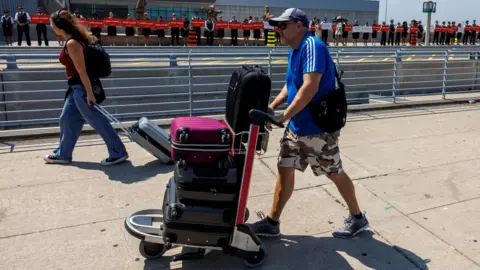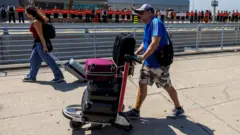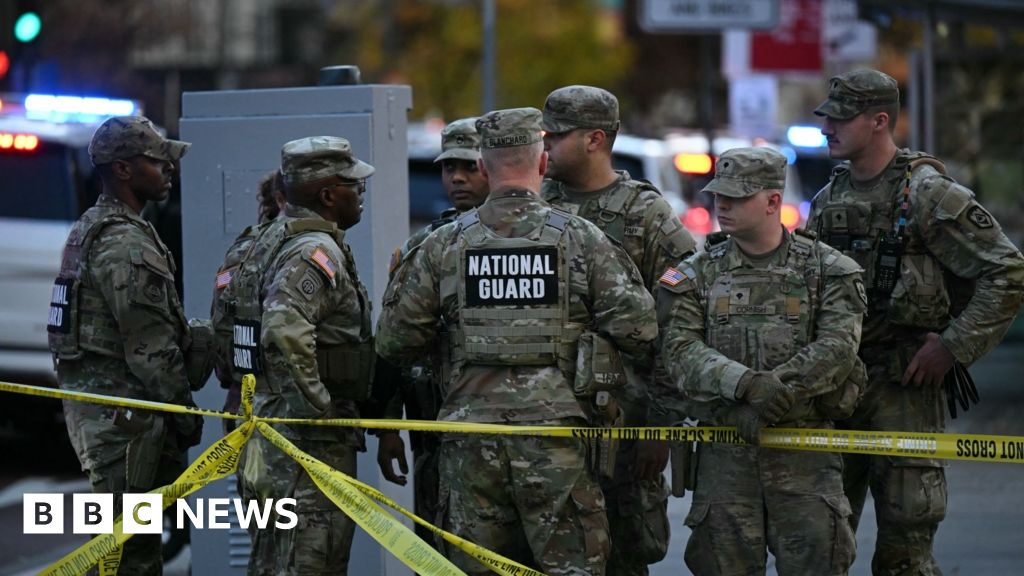BBC News
 Reuters
ReutersAir Canada flights will resume on Saturday evening, as a strike by its 10,000 cabin crew came to an end.
The Canadian Industrial Relations Board (CIRB) told the airline’s staff to return to work and said that an expired collective agreement would be extended until a new one was agreed.
The Cupe union, which represents Air Canada attendants, has not yet commented on the move. It yesterday accused the government of “caving to corporate pressure” and warned that tensions in the workforce would not disappear.
Here’s what you need to know.
When will Air Canada flights resume?
Air Canada said operations would resume immediately and that flights would take off this evening. It however expected several days of disruption before scheduling returned to normal.
The airline has warned that some flights would be cancelled over the next seven to 10 days and said that it “deeply regrets” customer inconvenience.
It said that those affected would be contacted and provided a new itinerary.
The airline added that customers in Canada were not eligible for compensation for delayed or cancelled flights because the strike action was out of its control.
Why was the strike called off?
Unionised workers were forced to end the strike after the government ordered a binding arbitration to end the dispute.
CIRB told staff to return to return to work by 14:00 EDT (18:00 GMT) and said that a collective agreement that expired on 31 March would be extended until a new one was agreed, Air Canada said.
Why did Air Canada cancel flights?
As Air Canada suspended “all operations” due to a flight attendants’ strike that began Saturday, the federal government stepped in to force both parties to the bargaining table.
The attendants gave a 72-hour strike notice earlier this week, after contract talks reached an impasse.
Their union said the company was not addressing key issues such as wages and unpaid work, and the strike took effect shortly after midnight on Saturday.
Soon afterwards, the carrier began delaying and cancelling some flights. On Friday, it expected to scrap 500 flights, affecting 100,000 passengers.
With the strike in effect, the airline announced it would halt flights on its Air Canada and Air Canada Rouge service.
As the cancellations mounted, the Canadian government used its powers to force the airline and the union into binding arbitration, in an effort to minimise disruptions for travel and the economy.
The airline, which operates in 64 countries and has a fleet of 259 aircraft, warned that a “complete cessation of flying” would begin on Saturday, if the labour issues were not resolved. Air Canada Express flights, which carry about 20% of Air Canada’s daily customers, are not affected.
Still, a shutdown could affect 130,000 daily customers, including 25,000 Canadians.
Upon receiving the strike notice, Air Canada issued its own 72-hour lock-out notice and began winding down operations, delaying and cancelling flights over those three days.
Chief Operations Officer Mark Nasr explained the airline’s system was complex and not something “we can start or stop at the push of a button”.
What led to the strike?
The Cupe union has asserted that it bargained in good faith with the airline for more than eight months.
The airline said it recently offered flight attendants a 38% increase in total compensation over four years, with a 25% raise in the first year.
But the union said the offer was “below inflation, below market value, below minimum wage” and would leave flight attendants unpaid for some hours of work, including waiting at airports ahead of flights or during the boarding process.
They said wages had not kept up with inflation, so Air Canada’s suggested pay increase was “in effect, a pay cut”.
Almost all of the attendants – 99.7% – voted to strike earlier this month. The company asked the government to intervene.
Government representatives had facilitated some of the negotiations already, but the carrier went further and asked Canada’s jobs minister, Patty Hajdu, to refer the matter for binding arbitration.
How did the government respond to the strike?
On Saturday, Hajdu ordered Air Canada and Cupe into binding arbitration by invoking Section 107 of the Canada Labour Code.
“Despite significant supports from the government, these parties have been unable to resolve their differences in a timely manner,” Hadju said.
“I am exercising this authority because it is critical to maintaining and securing industrial peace, protecting Canadians and promoting conditions to resolve the dispute.”
Cupe has responded by accusing the of Liberal Party of “violating our charter rights”. They allege that forcing a bargain to end the strike will “ensure unresolved issues will continue to worsen by kicking them down the road”.
Earlier this week, Air Canada proposed having a third party step in to develop an agreement through what is called “binding arbitration”, but the union rejected this.
It then asked the government to force the parties into binding arbitration, pointing to recent government interventions in negotiations in the rail and port sectors.
In binding arbitration, an independent third party sets the terms of a contract in an agreement that is legally enforceable.
The union said in a statement on Friday that it had requested that Hajdu not intervene and, instead, allow “the parties to reach a resolution through free and fair negotiations, without undue interference”.
There was growing pressure from other parts of Canada, as well. The Board of Trade for the Toronto region had called for government intervention, while the province of Newfoundland and Labrador released a statement describing the impact of a strike as “catastrophic” for the tourism industry during the summer season.
What to do if your flight is cancelled
Air Canada has said it will notify passengers if there is a change to the flight’s scheduled departure time.
Customers whose flights are cancelled will be notified and will receive a full refund, the airline said. The company has also made arrangements with other Canadian and foreign carriers to provide customers alternative travel options.
If it’s a round trip, return flights are not automatically cancelled in case the passengers reaches the destination.
Those bookings can be cancelled with no fees.




